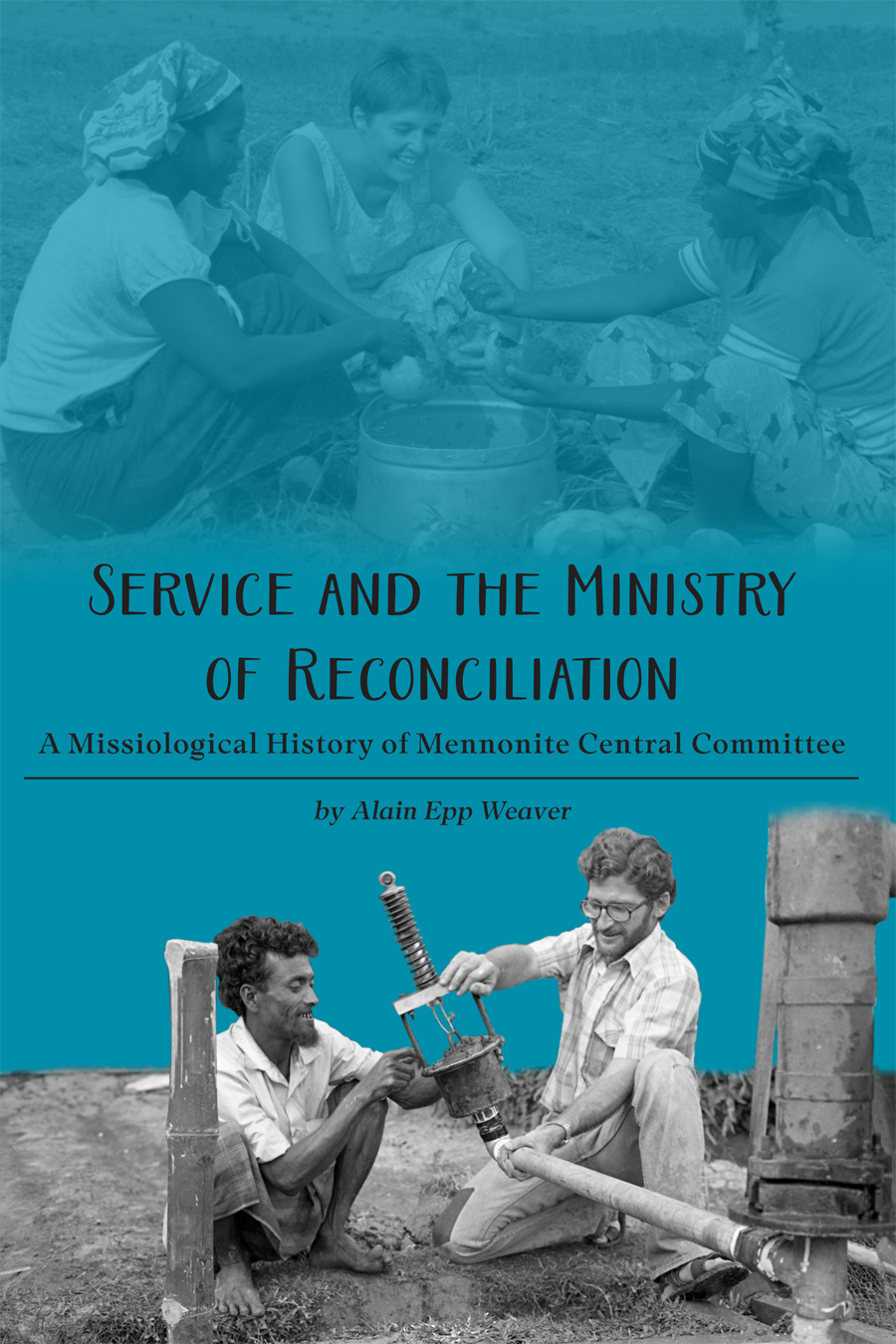
The Cornelius H. Wedel Historical Series was initiated by the Mennonite Library and Archives at Bethel College as part of the college centennial celebration in 1987. Cornelius H. Wedel, the first president of Bethel College from the beginning of classes in 1893 until his death in 1910, was an early scholar of Mennonite studies. His four volume survey of Mennonite history, published from 1900 to 1904, helped to rescue Anabaptism and Mennonitism from their marginal and denigrated portrayal in standard works of church history. Wedel saw Anabaptism and Mennonitism as part of a tradition of biblical faithfulness going back to the early church.
Wedel also believed in the cultivation of the intellect in all fields of knowledge. The current college mission statement continues the commitment to intellectual, cultural, and spiritual leadership for the church and society. The Wedel Series furthers these goals by publishing research in Mennonite studies with a special emphasis on works with a connection to Bethel College, such as campus lecture series and projects based on the holdings of the Mennonite Library and Archives.
(Several of the volumes are available online. The links for the online versions are indicated below.)
Send order inquiries to:

by Alain Epp Weaver
What is Christian service? Where does Christian service take place? What communities does Christian service form? Who is understood to be serving whom in Christian service? How have some Christians understood service as an alternative to war and a witness to the gospel of peace? How is Christian service shaped by racism, colonialism, and other regimes of power? In Service and the Ministry of Reconciliation, Alain Epp Weaver addresses such questions through an historical account of Mennonite Central Committee's century of global relief, development, and peace ministries.
Vol. 21: Service and the Ministry: A Missiological History of Mennonite Central Committee. $10.00 paperback by Alain Epp Weaver. 128pp. 2020 ISBN 978-1-889239-13-2
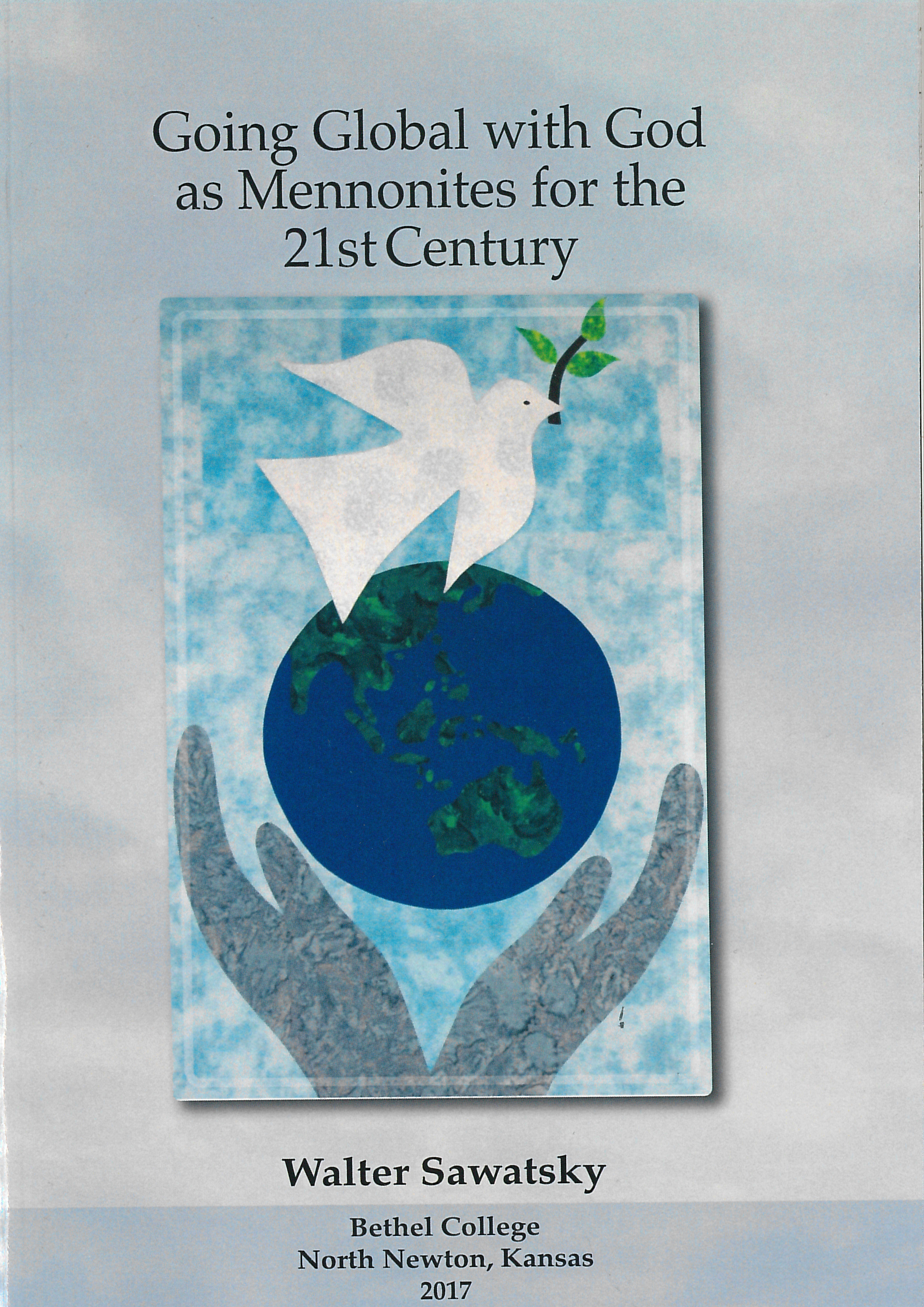
Over 30 years of international ministry, research, and teaching history and mission, Sawatsky has been on a protracted pilgrimage facing East, learning from Russian Orthodoxy and the many Evangelical expressions of the East in recent centuries. Repeated rethinking of history, theology, and mission in changing global contexts matters greatly for Mennonites in the 21st century. The task is to seek to glimpse the light and shadow sides of Mennonite and Christian history. Originally delivered as the Menno Simons lectures at Bethel College in 2014.
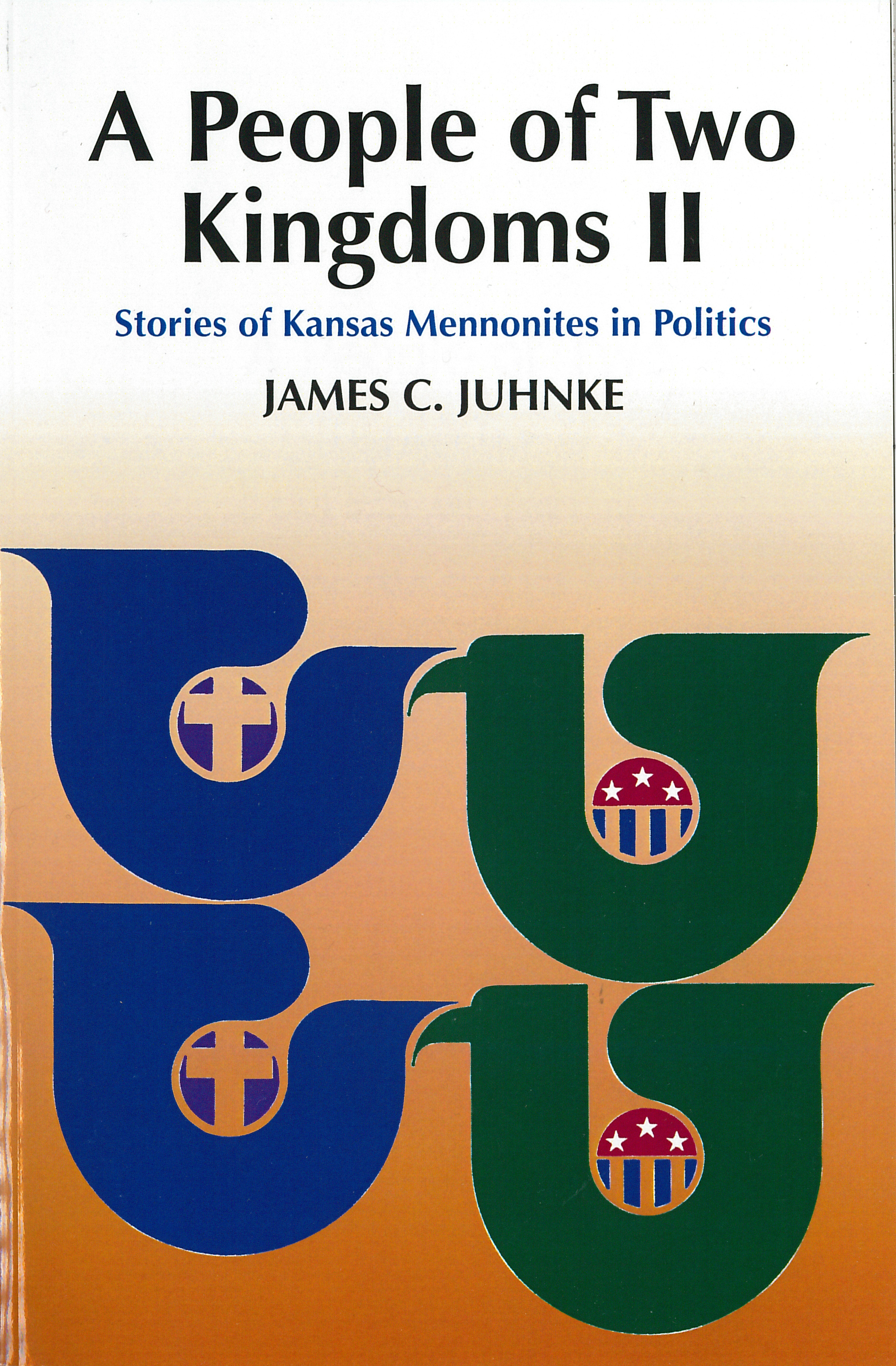
Jim Juhnke tells the story of Kansas Mennonites in state and national-level politics and stories of Kansas Mennonite politicians, including his own political activities, from 1940 to 2005. This book is a continuation of his 1975 volume A People of Two Kingdoms which covered the 1870s to 1940.
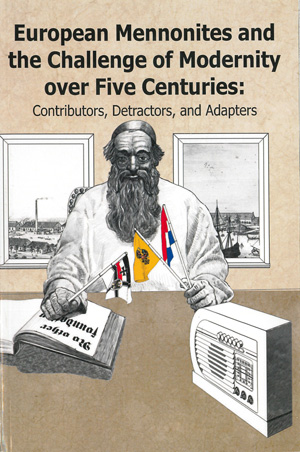
Were Anabaptists only relevant to European history for fewer than twenty years almost five centuries ago? The history of Anabaptism early in the sixteenth century has made its way out of the narrow confines of denominational history and onto the main stage of the European past, at least as reflected in history textbooks and in broader discussions of the Reformation. By the 1540s, however, it seems that Anabaptists and Mennonites no longer had a role to play in European history. This volume challenges that assumption. In fact, Anabaptists and, more narrowly, their successors the Mennonites, as alternative and cohesive communities that were Christian, pacifist, and non-state, influenced historical developments. Their unique status forced the societies and states where they lived to grapple with recurrent exceptions both to the laws and to overly simple assumptions about the proper behaviors of modern subjects and citizens. Although this community was often marginalized, it nonetheless provided models or stimuli for important developments in European religious, political, social, and economic policies and practices. This book grows out of an international conference "Marginal or Mainstream: Anabaptists, Mennonites, and Modernity in European Society" held at Bethel College, North Newton, Kansas, in June 2010. Contributors include Thomas A. Brady, Jr., Brian C. Brewer, Michael Driedger, Johannes Dyck, Ernst Hamm, Dilaram M. Inoyatova, Mark Jantzen, Rainer Kobe, Marion Kobelt-Groch, Frank Konersmann, Jeremy Koop, Karl Koop, Yme B. Kuiper, Troy Osborne, Walter Ratliff, James P. Regier, Mary S. Sprunger, John D. Thiesen, and Nataliya Venger.
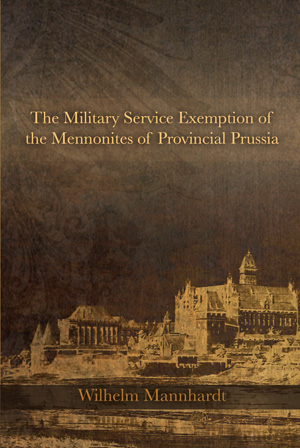
In the mid-nineteenth century, the Mennonites of the Vistula Delta region (what is now northern Poland) found their centuries-old exemption from military service under debate both from without and within. Mennonite leaders assigned Wilhelm Mannhardt, the first German Mennonite to earn a Ph. D. and later a pioneer scholar of German folklore, to research and write an extended explanation of the Mennonite position. In his own words, he was to produce "an exact and correct knowledge of the main issues of the historical foundation on which the Mennonites base their religious perspective and privilege" with "dependable historical and statistical evidence that is closely related to the questions of nonresistance and exemption from military service."
Mannhardt argued that the Mennonite principle of not serving in the military was based on religious conviction, not political or material expediency (as some of their neighbors and rulers suspected), and that it had a long history going back to the sixteenth century, including many formal recognitions by rulers. The main audience when the book originally came out in 1863 was Prussian government officials and legislators, and public opinion leaders. The book also was an element in the internal Mennonite debate about how to adapt Mennonite identity to their contemporary world. In an extended essay published in 1868-1870, Wilhelm Mannhardt argued that Mennonite exemption from military service, despite its authentic place in the Mennonite past, was no longer relevant and that Mennonites should accept some form of patriotic service.
Mannhardt's book was the first, and for many decades the only, history of the Vistula Mennonites, who were one of the largest regional Mennonite groups from the sixteenth to the twentieth centuries, and the source of the more widely-known Russian Mennonite experience. His work is foundational for European Mennonite historiography and this English translation makes it available, after 150 years, to a much wider reading audience.
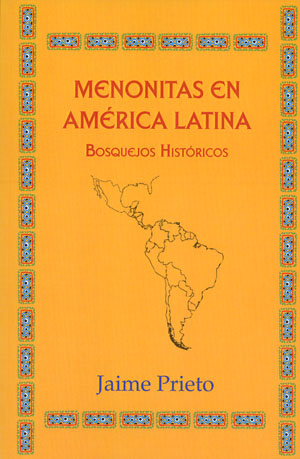
En 2005, Jaime Prieto de la Universidad Bíblica Latinoamericana de San José, Costa Rica, abrió un nuevo camino al ser la primera persona de dictar las conferencias "Menno Simons" en el español en Bethel College. Ahora, la Serie Wedel de Conferencias hace lo mismo por publicarlas en dos idiomas, el español original y la traducción en el ingles.
Prieto examina el tema de "Anabautistas en la América Latina" desde varios aspectos inusuales. En primer lugar presenta una tipología para las iglesias anabautistas de la región, las cuales divide en tres grupos: las de origen misionero; las de origen inmigrante (por ejemplo, los alemanes que vinieron al Paraguay en 1926, 1929 y 1947-49) y las de origen latinoamericano (como los menonitas k'ekchi' en Altaverapaz, Guatemala y las iglesias en Honduras de Amor Viviente). Al reflexionar sobre la tipología y la diversidad de modelos de iglesias, Prieto nota que esta manera de abordar el estudio contribuye actualmente a la vida y la misión de las iglesias en el contexto lationamericano.
Después, Prieto pone énfasis en el deseo ferviente de hacer y promover la paz y la no violencia como se encuentra el las voces de niños latinoamericanos. El se refiere a dos de estas voces, la primera en un poema escrito en 1937 por Benjamin Hugo Luayza, hijo de un pastor menonita de la Argentina, y la otra de Antonio Mosquera que describe verbalmente la persecución de los misioneros de la Iglesia de los Hermanos Menonitas en Colombia en las décadas de los 40 y 50.
Prieto también subraya la importancia de comprender la historia latinoamericana desde la perspectiva femenina. Emplea la biografia de Melita Legiehn Kliewer Nikkel, nacida en Omsk, Siberia en 1924. Ella huyó con su familia desde Rusia a Alemania cuando tenía apenas cinco años. Más tarde la familia se trasladó a la Colonia Fernheim en Paraguay y en 1952, al casarse por segunda vez, ella fue a vivir en Brasil.
Finalmente, Prieto aborda el desafío desde la perspectiva de la misionología y la eclesiología por medio de la visión de Cecilia Espinoza Jiménez, una mujer indígena trique de Oaxaca, México. La visión de Cecilia, dice Prieto, demuestra la relación entre el cielo y la tierra y la necesidad di mirar la espiritualidad desde el punto de vista de la Palabra y la lucha diaria de sobrevivir que experimentan tantas personas. Personas como Cecilia, dice Prieto, nos hacen recordar la necesidad de conectarnos de nuevo con Dios y la naturaleza y de reconocer la importancia de colaborar en varias maneras.
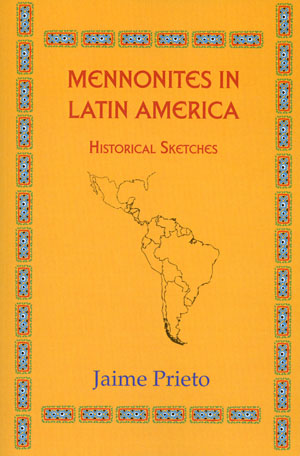
In 2005, Jaime Prieto of Universidad Bíblica Latinoamericana, San José, Costa Rica, broke new ground by being the first person to give the Menno Simons Lectures at Bethel College in Spanish. Now the Wedel Series does the same by publishing both the original Spanish and the English translation.
Prieto examines the topic of “Anabaptists in Latin America” from several unusual angles. First, he looks at a typology for Anabaptist church groups in the region, dividing them into three groups: those of foreign missionary origin; those of immigrant origin (e.g., Germans who came to Paraguay in 1926, 1929 and 1947-49); and those of Latin American origin (e.g., the K’ekchi’ Mennonites in Altaverapaz, Guatemala, the Amor Viviente churches in Honduras). Reflecting on the typology and the diversity of models of the church, Prieto says, helps in evaluating ongoing life and mission in Latin American contexts.
Next, Prieto emphasizes the inspiration toward peacemaking, peace-building and nonviolence found in the voices of Latin American children. He recovers two of these voices, one found in a poem written in 1937 by Benjamín Hugo Luayza, the young son of an Argentinean Mennonite pastor, and the other that of Antonio Mosquera in an oral history recording his schoolboy memories of the persecution of Mennonite Brethren missionaries in Colombia in the 1940s and ’50s.
Prieto also highlights the importance of understanding Latin American Mennonite history from women’s perspective as well as men’s. He uses the biography of Melita Legiehn Kliewer Nikkel, born in Omsk in Siberia in 1924, who fled Russia with her family at age five for Germany and then the Fernheim Colony in Paraguay, finally settling in Brazil in 1952 after her second marriage.
Finally, Prieto deals with the challenge of missiology and ecclesiology through the vision of Cecilia Espinoza Jiménez, an indigenous Trique woman from Oaxaca, Mexico. Cecilia’s vision, says Prieto, outlines the relationship between heaven and earth and the need to view spirituality from both the vantage point of the Word and the daily struggle for survival that many experience. People like Cecilia, Prieto says, remind us of the need to reconnect to God and nature, and to the importance of collaboration on many levels.
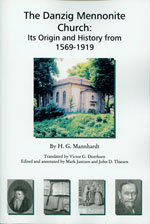
(Co-published with Pandora Press)
This volume was originally published in 1919 in Germany for two reasons. One was the desire to reflect on three hundred fifty years of congregational history, going all the way back to the initial leadership provided by Dirk Philips, one of Menno Simons' most important co-workers. Celebrating the centennial of the congregation's church building, which stands to this day in Gdańsk, Poland, was the second reason. The author, Hermann Gottlieb Mannhardt, served the congregation as pastor from 1878 to 1927 and was an important leader of the German Mennonite church. The wide-ranging congregational history he wrote places the Mennonite community of Danzig/Gdansk in its broader context as a religious minority that faced persistent discrimination in early modern and modern Germany and as a vibrant urban congregation in the midst of a large rural Mennonite community. Mannhardt's account is important to Mennonite history for bridging the gap from the Anabaptists of the sixteenth century to the larger and better-researched Mennonite communities of Russia founded in the late 1700s by the Mennonites of the Vistula Delta region. This volume also reminds contemporary urban Mennonites that some Mennonites have always lived in cities.
Special features of this translation include an epilogue by Pastor Tomasz Ropiejko, lead pastor of the Pentecostal congregation that has used the former Mennonite church building in Gdańsk since the 1950s. His account updates the history of the building and relates the struggles the congregation faced to reclaim this building for worship. Original maps make the streets and villages of Mannhardt's account easy to locate. Editorial annotations to the original text explain passages that might otherwise remain obscure and highlight as well the places where Mannhardt's nineteenth-century perspectives shaped his interpretations.
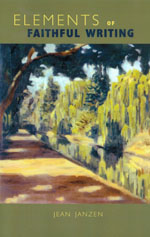
(Co-published with Pandora Press)
Noted Mennonite poet Jean Janzen reflects on the writing of poetry and literature and the role of authors from a Christian perspective, using guiding metaphors of Mud, Water, Fire, Air, and Text. The result is an evocative tapestry of images, textures, words, and sounds, woven from elements both historical and contemporary. Originally delivered as the Menno Simons lectures at Bethel College in November 2003.
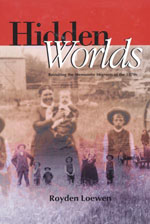
In the 1870s, nearly one-third of the Mennonite population in Imperial Russia emigrated to the United States and Canada. These Mennonite immigrants have sometimes been characterized as conservatives who attempted to "transplant" their institutions and customs from the Old to the New World. According to this view, the immigrants of the 1870s migrated to preserve their old society, rather than to build new ways of life in North America.
Through a close examination of a variety of documents - diaries, letters to immigrant newspapers, and tax rolls - historian Royden Loewen shows that the 1870s Mennonite immigrants were in fact creative and innovative. In the "hidden worlds" of their private lives, they were able to maintain some of the most important aspects of their Mennonite identity - such as pacifism and community-run institutions - while also adapting their old social structures to a new environment. Loewen argues that, in fact, private social practices, hidden from public view, were the undergirdings of these immigrants' successful integration into North American society.
(co-published with University of Manitoba Press)
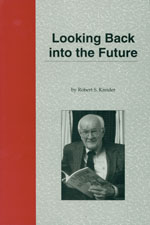
Robert Kreider took part in almost every Mennonite initiative of the last half of the 20th century: higher education, peace activism, voluntary service, Civilian Public Service, MCC relief service and administration, environmentalism, historical research and writing, and China missions. This collection of sixty-six essays, speeches, letters, articles, poems, and other reflections runs the gamut from a 1934 high school oration to a 1998 commentary at a Mennonite history conference. The range of writing includes not only commentary on public activities but also stories of family and personal life.
Looking Back into the Future was released at the "Walls and Windows: Creating and Nurturing Viable Community" symposium held at Bethel College, Nov. 19-21, 1998, in Robert Kreider's honor.
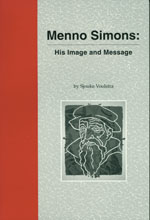
Menno Simons is someone from a distant past. Everything that remains of him is congealed in dead letters, and it is our task to exert the greatest possible empathy and receptivity to allow the message locked in the words to filter through to us. What perception have we formed of Menno Simons through the course of history? How reliable are the facts? To what extent are the interpretations products of their times?
Sjouke Voolstra reviews how past generations of Mennonites have appropriated Menno Simons and offers his own interpretation in this book, which was originally presented as the Menno Simons Lectures at Bethel College in fall 1995. Voolstra tells us that "the memory of the messenger is kept alive, while his message is scarcely listened to." Menno is "waiting patiently until someone gives him a face and a voice again."
Voolstra offers us a brief sketch of Menno's face and a sampling of his voice. We see Menno in his context as a Catholic priest, trying to offer his people a path to true penitence. This pastoral concern for the church moved from a Catholic church offering magical power in the sacraments to finding the real presence of Christ in the obedient congregation. And, finally, his understanding of baptism as a sign of obedience to Christ developed as Menno steered among various factions of Anabaptist fanatics.
Voolstra was professor of Mennonite theology at the University of Amsterdam and dean and professor at the Mennonite Seminary, which is affiliated with the university.
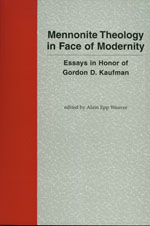
Gordon Kaufman has been central to the Mennonite theological conversations around the possibility and nature of a Mennonite theology. While other collections of essays have centered on Kaufman's place in the field of theology in general, this Festschrift focuses on his place in the Mennonite conversation. The essays here will give the reader an introduction to the breadth and depth of the Mennonite theological conversation, which Kaufman has done much to shape. Contributors include James C. Juhnke, Donald Stoesz, Harry Huebner, Daniel Liechty, Duane Friesen, Carl S. Keener, Ted Grimsrud, Ted Koontz, J. Denny Weaver, Tom Finger, A. James Reimer, and Scott Holland.
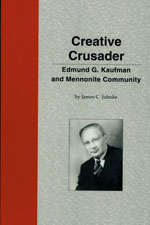
Edmund G. Kaufman (1891-1980) was one of the most influential Mennonite leaders in the mid-twentieth century. He served as a missionary in China (1917-1926), as president of Bethel College (1932-1952), and as senior statesman in the General Conference Mennonite Church. Juhnke's biography tells of Kaufman's family community in Kansas, his education and preparation for leadership, and his ministries of service in the church. Kaufman was an outspoken, progressive, and controversial person who attempted to inspire his people to a more expansive vision of service and mission.
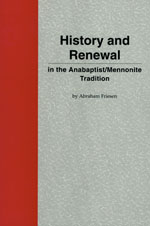
Mennonites have repeatedly appropriated (or misappropriated) their history for purposes of renewal. Fifty years ago, Harold S. Bender propounded the "Anabaptist Vision," the defining statement of Mennonite identity since then, known not just to scholars but to the average church member as well. Historical visions are composed for particular situations and eventually decline in attractiveness. What came before Bender's Anabaptist Vision? What declining paradigm did he replace or revise? Friesen explains the work of Ludwig Keller, a 19th century, non-Mennonite, German historian who reacted against the condemnation of Anabaptism by mainstream Protestant historiography. Keller saw his Mennonite contemporaries as the potential center of an "old evangelical" ecumenism of free churches against mainstream Protestantism. Keller strongly influenced later Mennonite historians such as John Horsch and C. H. Wedel. These chapters were originally delivered as the Menno Simons Lectures in fall 1992 at Bethel College. Friesen is professor of history at the University of California at Santa Barbara and chairman of the Mennonite Brethren Historical Commission.
Mennonite Literary Voices Past and Present evaluates Mennonite literature from its Anabaptist origins to the present. Chapter topics include the Russian Mennonite tradition, themes and issues in contemporary Mennonite writing, women writers, and literature and community. Al Reimer is Professor Emeritus of English at the University of Winnipeg.
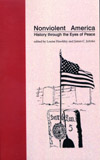
(online edition - 1993 edition)
(online edition - 2004 reprint)
Nonviolent America proposes a creative new peace-oriented approach to American history. The volume includes essays and critiques by fifteen scholars, prepared for a conference on "Violence and Nonviolence in the American Experience" at Bethel College in April 1992. Some of the essays address historiographical issues: Charles Chatfield, John Howard Yoder, James Juhnke, and others. Others present case studies on topics related to violence and nonviolence: William Unrau, Valarie Ziegler, Ken Brown, James Lehman, Ivan Kauffman, Steve Longenecker and others. Some scholars deal with challenges of teaching from a peace perspective: Carol Hunter, Rachel Waltner Goossen, William Juhnke. The essays range across the scope of American history, from the colonial era to the twentieth century.
Susan Toews of Ohrloff, Molotschna, began writing to her brother Gerhard in Canada before Russia's new political order was ten years old. She and other Germans in the Ukraine had experienced the fury of revolution and civil war in 1917. From 1928 to 1941 Susan wrote regularly to her brother in Canada describing the process of collectivization and dekulakization as it affected her and her family. She describes the destruction of ecclesiastical leadership and confiscation of churches which effectively ended the religious life of Mennonite colonies after over a century in Russia. She describes the decline of Mennonite piety, as Russian repression had the intended effect on the younger generation.
The failure of leadership and planning which continued to plague Soviet agriculture are apparent in her portrait of daily life. The hardships suffered by the Russian people under Stalin are described in an intimate fashion not found in scholarly works on the period. When the German armored divisions entered the Soviet Union in 1941, citizens of German background were deported eastward. Susan Toews, weakened from over a decade of malnutrition, was sent with others to Kazakhstan. They were given no food and only shovels to dig their own shelters which soon became their graves. Susan perished and her dreams of escape to Canada ended. The drama in Letters from Susan is tragic, but the story will fascinate those interested in the human side of Stalin's regime or the Mennonite experience in Russia. Translated and annotated by John B. Toews.
Based on the 1987 Menno Simons Lectures at Bethel College, Estep's work places into context the struggle for religious freedom in the United States. The American drama began in Europe during the Reformation of the sixteenth century. Major reformers, such as Luther and Zwingli, soon rejected the concept of religious liberty, and persecuted groups, like the Anabaptists, developed the concepts of separation of church and state and religious freedom which later fueled the debates in the American colonies on the limitations of the state's authority over religion.
The constitutional guarantee of religious freedom in the United States became reality in most states with the ratification of the First Amendment in 1791, and the Fourteenth Amendment in 1868 reinforced the Bill of Rights. In the 1980s these rights are being reinterpreted and circumvented. Estep finds it ironic that those with the most to lose are in the vanguard of this movement. He calls on those in the Free Church tradition to reexamine their heritage of freedom. A crisis of faith has developed with regard to the benefits of religious freedom itself.
Estep examines religious liberty with respect to "the Anabaptist Legacy," "the English Connection," and the "Conflicting Visions in Puritan New England." This book is essential reading not only for those from Anabaptist, Quaker, and English Baptist backgrounds whose traditions shaped the ideology of religious liberty in America, but also for anyone concerned with the current discussion of and threats to religious liberty.
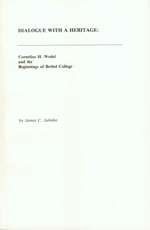
Juhnke, Professor of History at Bethel College, examines the foundation of Bethel College a century ago through an analysis of the ideas of Cornelius H. Wedel, prominent Mennonite historian and the first president of the college. German culture and American democracy in addition to the Anabaptist/Mennonite tradition shaped the vision for Bethel College. Wedel himself developed a unique concept of congregational christendom (Gemeindechristentum), which expressed God's truth better than the traditional state churches. Wedel died suddenly in 1910, and his synthesis, expressed primarily in works never translated into English, never became well-known even among Mennonite scholars. Yet Wedel and his heritage continued to shape Bethel College and form the roots of Mennonite culture and doctrine. Juhnke's work is not a history of the college, but he investigates themes related to Mennonite higher education, historiography, and culture which should be of interest to all students of Mennonitism.
Sawatsky examines the problem of authority in the face of modernity within the 62,000 member General Conference Mennonite Church. How has the theological, sociological, and historical identity of the denomination been formed? The movement toward increasing cooperation and even union with the (Old) Mennonite Church forces the General Conference to consider its precarious identity. Has the General Conference emphasis on freedom and autonomy been coopted by modernity? Based on the 1985 Menno Simons Lectures at Bethel College.